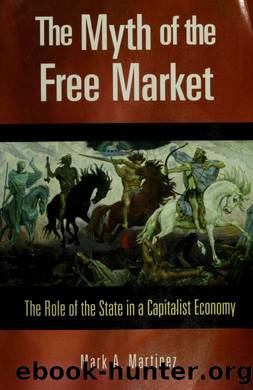The myth of the free market : the role of the state in a capitalist economy by Martinez Mark A. (Mark Anthony) 1961-

Author:Martinez, Mark A. (Mark Anthony), 1961-
Language: eng
Format: epub
Tags: Capitalism, Free enterprise
Publisher: Sterling, VA : Kumarian Press
Published: 2009-05-14T21:00:00+00:00
At Geneva the United States initially wanted to create freer trade by getting Britain to-abolish its. colonial system of preferences (which granted favorable terms of trade to British colonies) but had to settle for an agreement that opened only one marketâits own. 44 Although Britain wouldnât relent on its system of preferences, the United States realized that providing a united front against the Soviets and stability was so important that a skewed deal was considered to be better than no deal. This mind-set helped produce the General Agreement on Tariffs and Trade (GATT), which provided a framework for international trade by establishing specific tariff rates, mandating reciprocity, and obligating member states to the principle of most-favored-nation (MFN) status. But concessions to the British were only the beginning.
Trading American Interests, II: The Nuts and Bolts
To drive home the point that economic recovery and growth in Europe and Japan were essential to countering Soviet expansion, the United States sponsored wartime enemies Italy, Germany, and Japan for membership in GATT. This didnât sit well with many, especially those who wanted to punish wartime losers. Sponsorship of former allies was followed by a bilateral trade agreement with Japan in 1955, and, according to critics, stands as perhaps the most egregious example of how the United States sacrificed domestic economic interests to larger international political realities. The National Security Council (NSC) got the ball rolling in 1952 by lobbying the White House and other national-level policymakers to get on Japanâs side, by encouraging Japanese exports into the United States. The NSC then convinced the Commerce Departmentâwhich stood up for American commercial interestsâto drop its opposition to generous policies that supported Japanâs economic recovery. With this decision there was little doubt that the State Department would prevail over the Commerce Department throughout the Cold War.
To be sure, authorities understood that domestic industries would complain about the unilateral opening of US markets. President Truman even created the Tariff Commissionâforerunner to the International Trade Commission (ITC)âwhich heard complaints from domestic producers, made recommendations to the president, and then made a âwithdrawâ or âmodifyâ proposal on specific tariff issues. Yet the Commission was consistently reluctant to find economic injury to domestic producers in the United States. From the manufacture of clothes pins to handblown glassware, fish products, and footwear (among other products), successive presidents ignored the Tariff Commission and ITC recommendations. These tactics didnât go over well with several members in Congress.
Download
This site does not store any files on its server. We only index and link to content provided by other sites. Please contact the content providers to delete copyright contents if any and email us, we'll remove relevant links or contents immediately.
Collaborating with Parents for Early School Success : The Achieving-Behaving-Caring Program by Stephanie H. McConaughy; Pam Kay; Julie A. Welkowitz; Kim Hewitt; Martha D. Fitzgerald(905)
Entrepreneurship Education and Training: The Issue of Effectiveness by Colette Henry Frances Hill Claire Leitch(673)
Adding Value to Policy Analysis and Advice by Claudia Scott; Karen Baehler(499)
Materializing the Middle Passage by Jane Webster;(498)
Race and American Political Development by unknow(490)
American Government and Politics Today by Steffen W. Schmidt Mack C. Shelley Barbara A. Bardes(488)
Sociological Perspectives of Health and Illness by Constantinos N. Phellas(487)
Human and Global Security : An Exploration of Terms by Peter Stoett(474)
Control Of Oil - Hardback by Kayal(470)
The Disappearance of Rituals: A Topology of the Present by Byung-Chul Han(410)
The Catholic Church and European State Formation, AD 1000-1500 by Jørgen Møller(403)
Advances in Child Development and Behavior, Volume 37 by Patricia J. Bauer(403)
The World According to China by Elizabeth C. Economy(387)
Theories of Counseling and Psychotherapy: A Case Approach by Nancy L. Murdock(381)
Left Is Not Woke by Susan Neiman(371)
Application of classical statistics, logratio transformation and multifractal approaches to delineate geochemical anomalies in the Zarshuran gold district, NW Iran by unknow(371)
Cross-Cultural Child Development for Social Workers by Lena Robinson(359)
Turkey's Relations with the West and the Turkic Republics: The Rise and Fall of the Turkish Model by Idris Bal(356)
Japan's Ainu Minority in Tokyo by Mark K. Watson(341)
